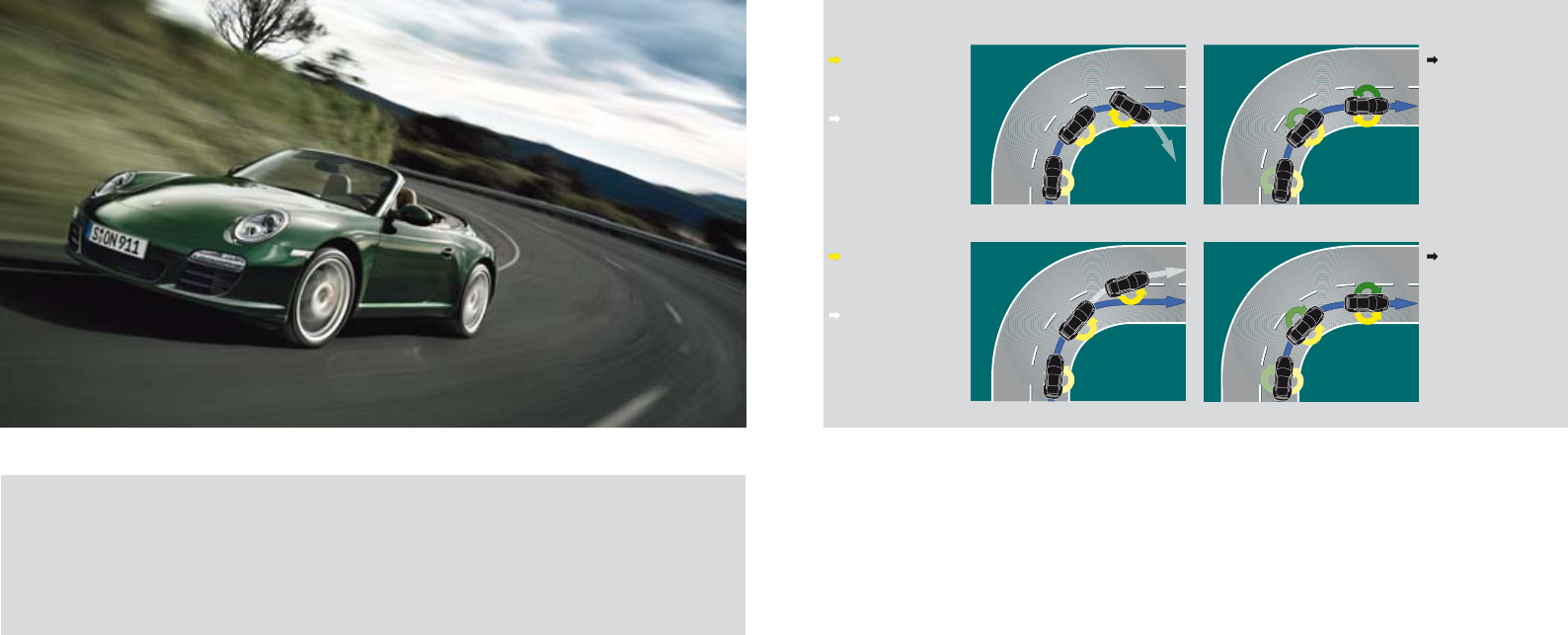
·70·
911 Carrera S Cabriolet
PSM is an automatic control
system for providing stability
at the limits of dynamic driving
performance, and is a standard
feature of every 911. Sensors work
continuously to monitor the driving
direction, speed, yaw velocity
and lateral acceleration of the car.
Using this information, PSM
computes the actual direction of
motion. If this direction deviates
from the desired course, PSM
initiates braking interventions
targeted at individual wheels –
recognisable by the flashing
indicator light in the cockpit –
in order to stabilise the vehicle.
Under acceleration on wet or
low-grip road surfaces, PSM
improves traction using the ABD
(automatic brake differential) and
ASR (anti-slip regulation) functions.
The control interventions are
smooth and precise, giving an
agile response.When ‘Sport’ mode
is selected on the optional Sport
Chrono Package Plus (p. 74),
the PSM intervention threshold is
raised to enable greater driver
A strong character knows when to take a back seat.
Porsche Stability Management (PSM).
·71·
The new 911 | Chassis
If the driver suddenly releases
the accelerator pedal, the PSM
automatically readies the braking
system. With the braking system
having been precharged, the
brake pads are already in light
contact with the brake discs.
Maximum braking power is
therefore achieved much sooner.
When sudden braking is detected
– i.e. if the pressure on the brake
pedal exceeds a predefined
level – the brake assist function
uses the PSM hydraulics to
apply maximum brake pressure
to all four wheels.
If you want a purely active driving
experience, you always have the
option to deactivate PSM. It is
automatically reactivated, for your
safety, only if either of the front
wheels (in sport mode, both of
the front wheels) requires ABS
assistance.The ABD function,
however, remains active at all
times.
In conclusion, PSM offers a high
level of driving stability and safety
– and typical Porsche agility at
the same time.
Oversteer with PSM
Understeer without PSM
Vehicle yaw/
course deviation
Vehicle yaw/
course deviation
Correction to
vehicle course
deviation and
stabilisation
Correction to
vehicle course
deviation and
stabilisation
Understeer with PSM
Oversteer without PSM
involvement – particularly at
speeds of up to approximately
70 km/h (45 mph).
The integrated ABS shortens
the braking distance even further
and the braking inputs are smooth
and precise, thereby enhancing
comfort.
An enhanced PSM system, now
also available in rear-drive models,
is characterised by two additional
functions: the precharging of the
brake system, and brake assist.


















